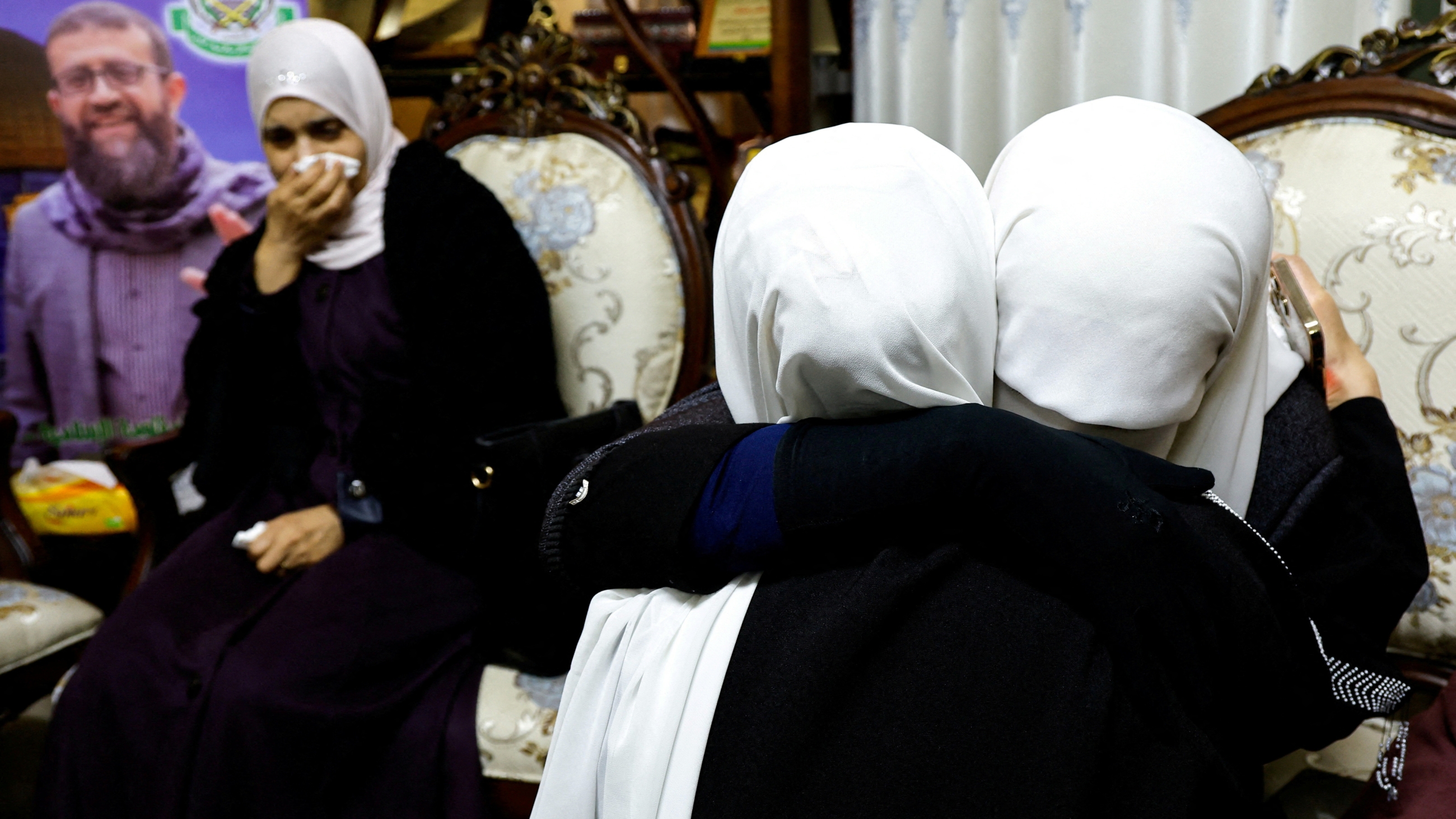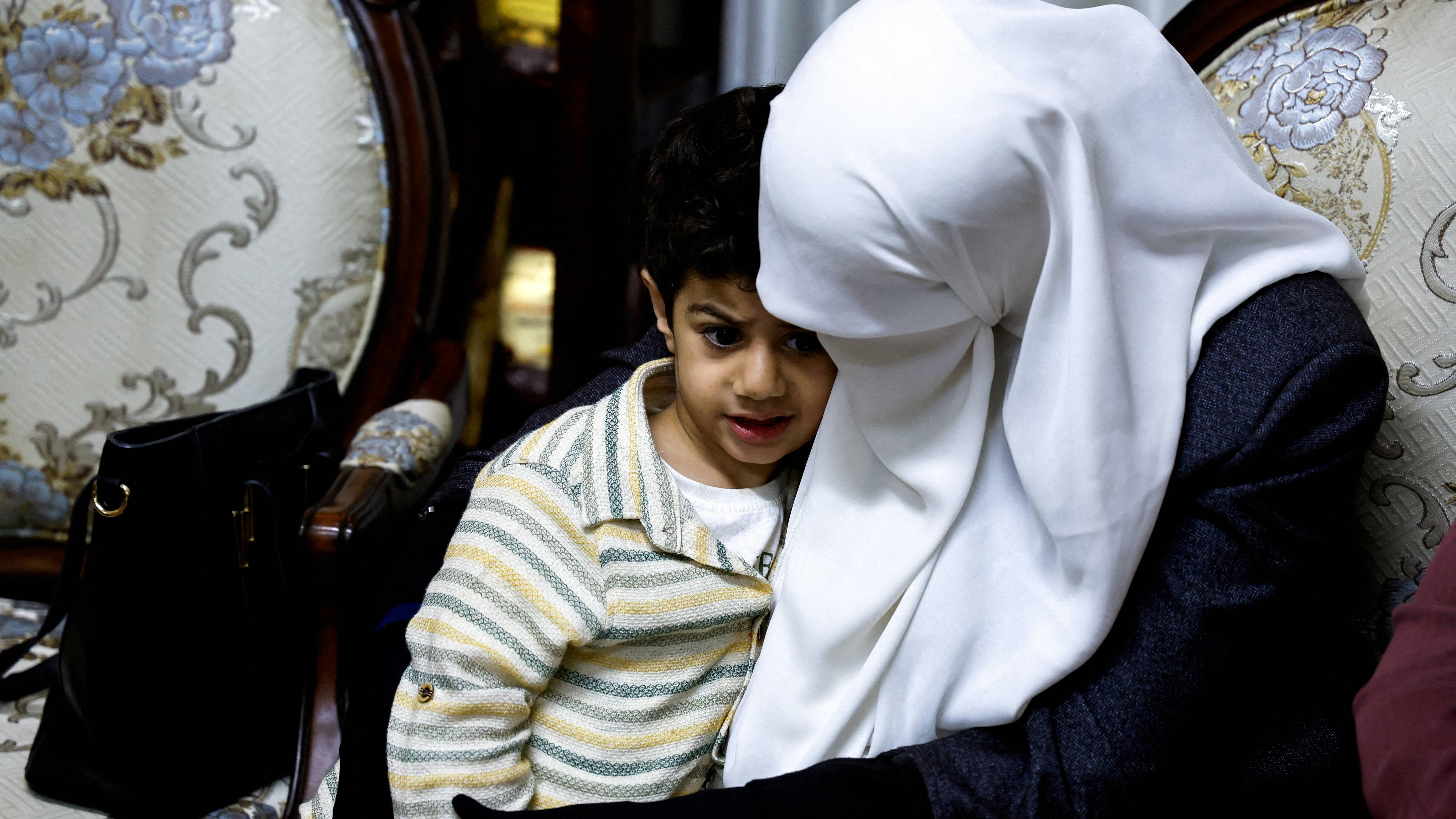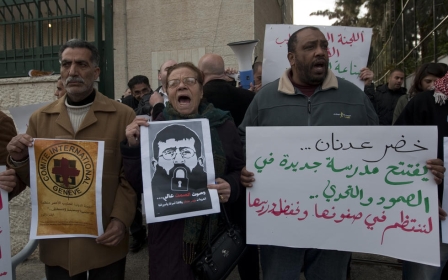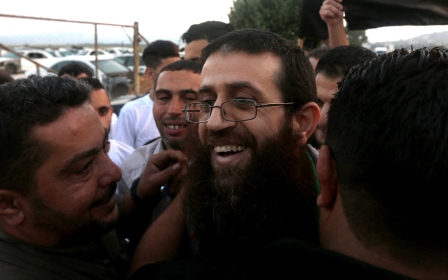Khader Adnan: Family and friends mourn hunger strike 'trailblazer'

For Abd al-Rahman Adnan, this year's Eid al-Fitr holiday was the worst he has ever experienced.
Instead of celebrating it with family and friends, the 12-year-old spent it taking part in protests with his siblings in the occupied West Bank city of Ramallah, advocating for his father's release from Israeli prison.
His father, prominent activist Khader Adnan, was on the 76th day of a hunger strike and it was clear his health was deteriorating.
“On every Eid holiday, dad would take us to the amusement park, play with us, make us happy, and buy us toys," Rahman told Middle East Eye.
“This year's Eid was the most devastating. My father was imprisoned by the occupation during four previous holidays, but this was the worst because he was on a hunger strike,” he added.
New MEE newsletter: Jerusalem Dispatch
Sign up to get the latest insights and analysis on Israel-Palestine, alongside Turkey Unpacked and other MEE newsletters
Ten days after Eid, Khader was found dead in an Israeli cell after an 87-day hunger strike.
His death shocked Palestinians across the occupied territories and beyond. Rockets were fired toward Israel from Gaza and marches were held in the West Bank.
In his hometown of Arraba, south of Jenin, mourners flocked to the funeral home, paying respects to the family. Each one recalled their own stories with the “Sheikh”.
“Sheikh Khader Adnan confided in his wife, Randa Musa, that upon his release and the conclusion of his hunger strike, he longed to eat the mansaf [a traditional dish] he enjoyed at our home,” said Asma Harish, a journalist, and sister of Ahmad Harish, a former Palestine Authority prisoner whose release campaigns were led by Khader.
“He tragically passed away before his wish could be realised,” Harish told MEE.
Loving husband and father
Known locally as Sheikh Khader, the 45-year-old was one of the most popular activists in the West Bank.
He gained international notoriety in 2012, after going on a 66-day-long hunger strike which ended in his release from administrative detention, a policy in which Israel holds Palestinians without trial or charge indefinitely.
In the years that followed, he grew to become one of the most active advocates for the Palestinian cause.
He is viewed as someone who never missed a march supporting Palestinian resistance, the rights of prisoners, or the families of those killed by Israel. He consistently led chants, echoed by the gathered crowds, and always occupied the front lines.
But for his wife Randa Musa, he was much more than that.
"If you ask about love, it is Khader,” said Musa, as more people arrived at the funeral home to pay their respect. “If you ask about tenderness, it is Khader; and if you ask about affection without conditions, it is Khader."
After graduating from Ramallah's Birzeit University with a bachelor's degree in economic mathematics in 2001, and later finishing a master's degree in economics, Khader and Musa married in 2005.
Despite his academic achievements, Khader believed in self-reliance and did not want to work for anyone, Musa tells MEE. So, he opened a bakery by his home, where he worked alongside his wife and children.
"His day would begin at 3 am, kneading dough, baking bread, and crafting manaqeesh,” Musa recalled.
“Then, he would head to the Qabatiya market, where he would call out: 'za'atar, cheese, za'atar, cheese,' selling the fruits of his labour with love and satisfaction."
Sat next to her mother, Ma'ali Adnan, Khader and Musa's eldest child, also began recalling a side of her father not many know.
At home, he was as busy as he was on the streets, she said.
'If you ask about love, it is Khader; if you ask about tenderness, it is Khader; and if you ask about affection without conditions, it is Khader'
- Randa Musa, Adnan's wife
Helping with homework, playing with the kids, doing household chores, and cooking dinners for the family.
"He would always cook for us, preparing the most delicious food with his unique recipes, which he invented himself, adding his creative flair to each dish," the 15-year-old said.
Nothing can describe Ma'ali's sadness, she added, but her consolation is that Khader passed away in the manner he desired.
"I feel a blend of sadness and happiness; I'm heartbroken for losing the most precious person in my life, but I'm also proud because he accomplished his goal,” she told MEE.
“Whenever he went to prison, he was determined to either be released as a free man or die as a martyr," she explained.
Struggle against indefinite detention
Khader's hunger strike in 2012, when he went 66 days without food - believed to be a record at the time - was a turning point in the struggle against administrative detentions.
Under the practice, Israel detains individuals - overwhelmingly Palestinians - without trial or charge for renewable periods of up to six months.
The policy imposes no obligation on the Israeli government to present any official suspicions or evidence to justify an arrest or detention, which critics argue violates international law.
Today, there are around 1,000 administrative detainees, the highest number in 20 years.
After Khader's strike in 2012 pressured Israel into releasing him, many held under the same policy followed suit.
Among them was Maher al-Akhras, who spent 103 days on hunger strike in 2020 before being released from administrative detention.
He knew Khader inside and outside prison.
“Adnan consistently displayed ferocity in confronting the occupation, demonstrating unwavering stubbornness, even inside the prison,” Akhras told MEE.
“He resisted the jailers' attacks, positioning himself at the forefront to receive the blows and protect his fellow prisoners," he said, recalling Khader's time in prison.
Another detainee inspired by Khader is Alaa al-Araj, who went on a 103-day hunger strike in 2021 before being released from administrative detention.
During his arrest, it was Khader that led solidarity campaigns for al-Araj's release, standing at the forefront of rallies chanting his name.
"I will never forget the personal stance he took, as he never abandoned me during my hunger strike battle,” Araj told MEE. “I pray to God that we have not failed him."
Araj said despite being consistently targeted, vilified, and harassed by the Israeli military and the Palestinian Authority security forces, Khader never gave up on advocating for other prisoners, especially hunger strikers.
He also never bowed down to repeated Israeli arrests - there were 12 in total and he spent a total of eight years of his life behind bars.
He launched six hunger strikes throughout his arrests, lasting 25 days in 2004, 66 days in 2012, 56 days in 2015, 58 days in 2018, 25 days in 2021, and 87 days this year.
Even after his tragic death, Araj believes that hunger strikes are still the best way to resist the unjust Israeli practice of administrative detentions.
“He was a trailblazer,” Araj said.
“He is a leader of this movement, the first to forge this path, and the first to achieve victory on it.”
Middle East Eye delivers independent and unrivalled coverage and analysis of the Middle East, North Africa and beyond. To learn more about republishing this content and the associated fees, please fill out this form. More about MEE can be found here.







